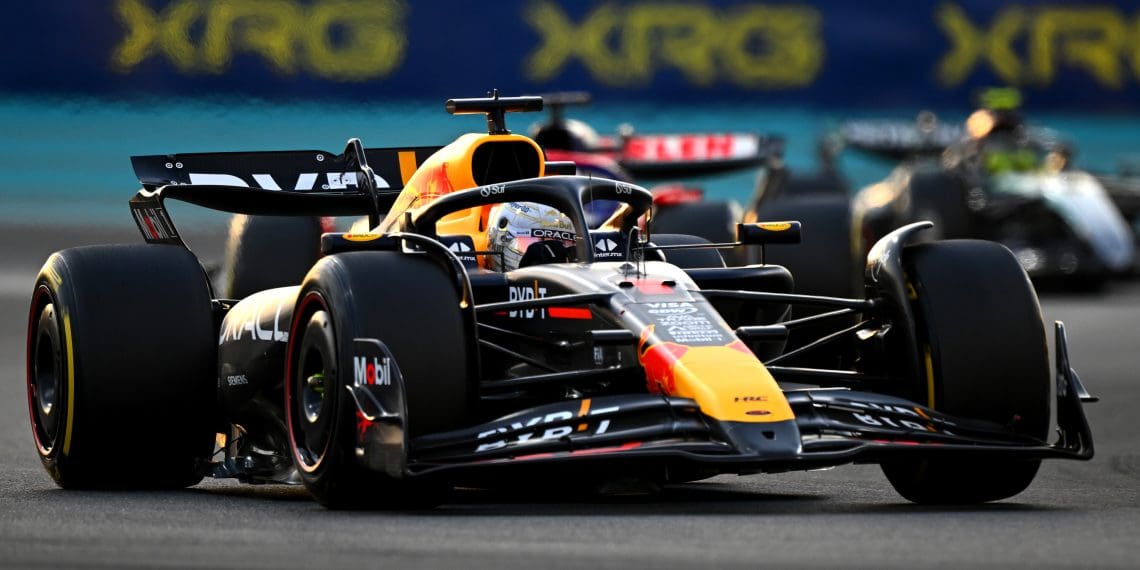Domination in motorsport is a double-edged sword. For fans of the winning driver, it’s exhilarating; for everyone else, it’s monotonous. The phenomenon polarizes the audience, with one camp reveling in their hero’s triumphs and the other growing increasingly bitter. Few athletes understand this paradox better than NASCAR legend Jimmie Johnson. And now, Johnson’s experience seems to echo in the career of Max Verstappen, Formula 1’s reigning force.
Johnson, who captured seven NASCAR championships, recently opened up about the struggles of sustained excellence during an interview with High Performance. His reflections offered rare insight into the unique challenges of dominating a sport, and his words carry valuable lessons for Verstappen, who is navigating a similarly polarizing path in Formula 1.
Jimmie Johnson and Max Verstappen: A Tale of Two Titans
Asked whether he saw parallels between his journey and Verstappen’s, Johnson didn’t hesitate. “I think maybe, yeah,” Johnson said. “There will be common points through it, especially if he keeps going and hits seven or eight [championships].”
Verstappen, at just 27, has already claimed four consecutive F1 World Championships and shows no signs of slowing down. His relentless dominance on track has drawn comparisons to Johnson’s era of NASCAR supremacy. Yet, both drivers have faced an unsettling backlash for being “too good.” Fans and media alike have criticized Verstappen’s stoic demeanor, dubbing him “T-5000” for his calculated, seemingly emotionless approach to racing—an experience Johnson knows all too well.
“They thought I was a robot,” Johnson recalled. “I was called ‘vanilla’ for the longest time… I’d read comments like, ‘You’re too boring, all you do is win.’ And I’m like, ‘God, it sucks to be me.’”
Why Winning Turns Fans Away
There’s a cruel irony to dominance. What fans initially admire often turns into resentment. Johnson noted how his serious, focused demeanor—intended to elevate his performance—alienated segments of NASCAR’s audience. Verstappen faces similar scrutiny, with some accusing him of making F1 “boring” and predictable.
Yet, as Johnson emphasized, the backlash often says more about the fans than the athlete. “People want to see competition. When someone wins too much, it’s natural for others to root against them. It’s part of the game.”
The Numbers Don’t Lie: Verstappen’s Path to Greatness
Like Johnson, Verstappen’s accomplishments are staggering. He already holds the record for most wins in a single F1 season, surpassing legends like Michael Schumacher and Sebastian Vettel. With Red Bull consistently producing championship-caliber cars, Verstappen is poised to challenge the records of Lewis Hamilton and Schumacher, both seven-time champions.
However, Verstappen insists he’s not chasing those numbers. “No. I’m not interested in winning seven or eight titles,” Verstappen said. “If you have the car to do so, then great. But even if it doesn’t [happen], I’m happy—I’m already happy, so it’s OK!”
What Verstappen Can Learn from Johnson
Johnson’s career serves as both a cautionary tale and a source of inspiration for Verstappen. While the criticism stung, Johnson ultimately embraced his role as a dominant figure in NASCAR history. He advised Verstappen to focus on the journey, not the noise.
“It’s funny how people view you,” Johnson said. “But it’s important to remember why you’re doing this. Winning takes everything, but it’s also incredibly rewarding.”
Johnson’s journey shows that the most dominant athletes often face the harshest scrutiny—but their success speaks for itself. For Verstappen, the path forward is clear: stay true to his craft and let the results do the talking.
Destined for Debate, Defined by Greatness
As Verstappen continues to carve his legacy, he faces the same polarizing reactions that Johnson endured. Fans will debate his dominance, critics will call him boring, but history will remember the trophies.
In the end, Verstappen’s story, much like Johnson’s, reminds us of a simple truth: “Haters hate, winners win.” Whether or not Verstappen matches the seven titles of Schumacher, Hamilton, or Johnson, his impact on the sport is undeniable. As Johnson aptly put it, “They can hate all they want, but they can never deny your success.”










